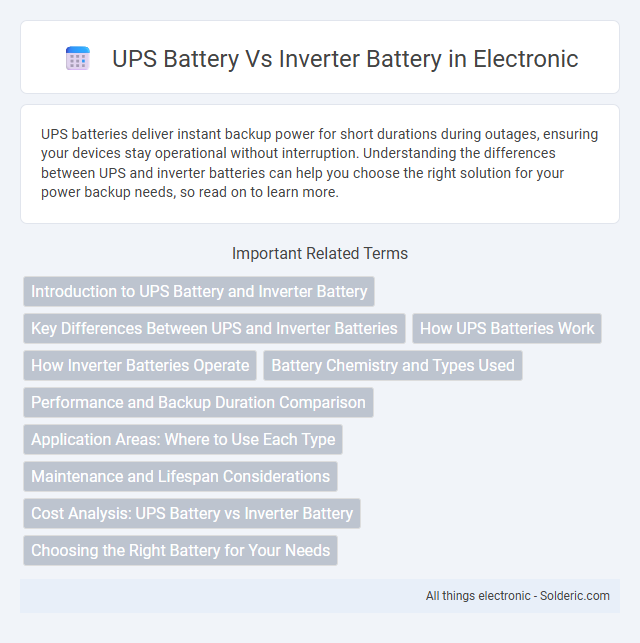UPS batteries deliver instant backup power for short durations during outages, ensuring your devices stay operational without interruption. Understanding the differences between UPS and inverter batteries can help you choose the right solution for your power backup needs, so read on to learn more.
Comparison Table
| Feature | UPS Battery | Inverter Battery |
|---|---|---|
| Purpose | Provides instant power backup during electrical outages to protect sensitive electronic devices. | Supplies power during outages, primarily for home appliances, with a slight delay in switching. |
| Power Delivery | Immediate, uninterrupted power with zero transfer time. | Delayed power supply with transfer time typically a few milliseconds. |
| Battery Type | Sealed Lead Acid (SLA), VRLA, or Lithium-ion batteries. | Mostly Tubular Lead Acid or Flooded Lead Acid batteries. |
| Backup Duration | Short-term backup (minutes), designed for brief outages. | Longer backup (hours), suitable for extended power cuts. |
| Maintenance | Low maintenance; sealed batteries require minimal attention. | Moderate maintenance; tubular and flooded batteries may need topping up and checks. |
| Cost | Generally higher cost per unit capacity due to technology. | Lower cost per unit capacity; more affordable for extended backup. |
| Application | Computers, servers, networking equipment requiring zero power interruption. | Home appliances, fans, lights, and non-critical electronics. |
Introduction to UPS Battery and Inverter Battery
UPS batteries provide immediate backup power to protect your electronic devices during outages, ensuring uninterrupted operation with rapid switching capabilities. Inverter batteries store energy to convert DC to AC power over longer durations, primarily supporting household electrical systems during prolonged power cuts. Choosing the right battery depends on your backup power requirements and the duration of power interruptions.
Key Differences Between UPS and Inverter Batteries
UPS batteries provide instant power backup with rapid switching, ensuring no interruption in your electronic devices, while inverter batteries support longer power supply during outages with slower switch times. UPS batteries tend to have shorter backup duration but deliver stable, clean power ideal for sensitive equipment, whereas inverter batteries offer extended backup suitable for home appliances. The key differences lie in their design, charging mechanisms, and intended use, where UPS batteries demand quick response and inverter batteries emphasize endurance.
How UPS Batteries Work
UPS batteries provide immediate backup power by storing electrical energy in lead-acid or lithium-ion cells, which supply electricity during power outages to prevent equipment shutdown. These batteries work through a charging cycle from the main power supply and discharge quickly when an interruption occurs, ensuring seamless power continuity. Unlike inverter batteries designed for longer backup periods with slower discharge rates, UPS batteries prioritize rapid energy delivery to support connected devices instantly.
How Inverter Batteries Operate
Inverter batteries store electrical energy to power home appliances during power outages by converting DC current into AC through the inverter unit. Unlike UPS batteries that instantly supply power to connected devices without interruption, inverter batteries provide energy with a slight delay as the inverter switches on. Your inverter battery's performance depends on its capacity, discharge rate, and chemistry, with lead-acid and lithium-ion types being the most common.
Battery Chemistry and Types Used
UPS batteries commonly use sealed lead-acid (SLA) or valve-regulated lead-acid (VRLA) chemistry, designed to provide backup power during short interruptions with rapid recharge capabilities. Inverter batteries often utilize tubular or flat-plate lead-acid types, optimized for longer discharge duration and frequent cycling to support extended power outages. Lithium-ion batteries are increasingly adopted in both UPS and inverter systems due to higher energy density, longer lifespan, and lighter weight compared to traditional lead-acid variants.
Performance and Backup Duration Comparison
UPS batteries typically offer faster response times and more stable performance during power outages, providing immediate backup without interruption. Inverter batteries generally have longer backup durations due to their larger capacity, making them suitable for extended power cuts but with a slight delay in switching. Your choice should depend on whether you prioritize quick power restoration or extended backup hours.
Application Areas: Where to Use Each Type
UPS batteries are ideal for critical applications requiring uninterrupted power supply, such as data centers, medical equipment, and communication systems, ensuring zero downtime during power outages. Inverter batteries are more suitable for residential or office settings with occasional power cuts, providing reliable backup for household appliances and essential electronics. You should choose UPS batteries for sensitive electronics needing instant power transition and inverter batteries for cost-effective, longer-duration backup.
Maintenance and Lifespan Considerations
UPS batteries typically require less frequent maintenance due to sealed lead-acid or lithium-ion technology, offering a lifespan of 3 to 5 years depending on usage and temperature conditions. Inverter batteries, often flooded lead-acid types, need regular watering, cleaning, and terminal checks, with a lifespan ranging from 2 to 4 years based on charging patterns and maintenance quality. Proper maintenance directly influences battery longevity and performance, making UPS batteries more suitable for low-maintenance applications while inverter batteries demand consistent upkeep to maximize lifespan.
Cost Analysis: UPS Battery vs Inverter Battery
UPS batteries generally have a higher upfront cost compared to inverter batteries due to their advanced technology and faster recharge capabilities. Inverter batteries, often lead-acid types, are more affordable but may require more frequent replacements, impacting long-term expenses. Evaluating total cost of ownership reveals UPS batteries offer better durability and efficiency, potentially lowering maintenance and replacement costs over time.
Choosing the Right Battery for Your Needs
Understanding the difference between UPS battery and inverter battery is crucial for choosing the right power backup solution. UPS batteries provide instant power supply and are designed for short duration outages, ideal for protecting sensitive electronics like computers. Inverter batteries cater to longer backup requirements, offering consistent power for household appliances, ensuring your devices stay operational during extended power cuts.
UPS battery vs inverter battery Infographic

 solderic.com
solderic.com